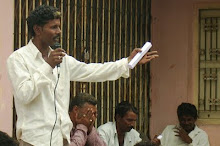Counterview: Ahmedabad: Sunday, March 01, 2015.
In an order
major policy implication, Gujarat's chief information commissioner (CIC) has
said that officials of the Gujarat government must respond to a right to
information (RTI) query involving “question of life and liberty” within 48
hours, instead of keeping things pending. And, the CIC added, if the entire
information is not there, “the available information should be provided within
48 hours” while rest of it could be “furnished expeditiously.”
Responding to
a complaint by Pankti Jog of the Mahiti Adhikar Gujarat Pahel (MAGP) over
failure of the state body Sardar Sarovar Narmada Nigam Ltd (SSNNL) to respond
to a query of “untimely” release of Narmada canal waters into Banas river in
North Gujarat, which led to the death of a woman, CIC Balwant Singh said in the
order, “If the respondent is of the opinion that the matter on which
information has been sought does not involve the question of life and liberty,
he should, in his reply, clearly specify the reasons for the same.”
The order
further said, if the official is of the opinion that the matter on which
information has been sought “does not involve the question of life and
liberty”, in that case also complainant should be told within 48 hours that
“information shall be provided within the maximum period of 30 days”, as
required by the RTI law.
Rapping the
SSNNL for not acting in accordance with the RTI law, which insists under
section 7(1) that reply to the complainant should be provided within 48 hours
from the date of receipt of the application if it on questions concerning “life
and liberty”, Singh has has now sought the reply of the SSNNL's public
information officer (PIO) in writing “within seven days” as to “why penalty
under Section 20(1) of the RTI Act be not imposed on him”.
Jog in her
complaint dated January 6, 2015 to the Gujarat Information Commission had said
that she had sought information under RTI on November 29, 2014 from the PIO,
SSNNL, Gandhinagar and the local PIO of the SSNNL office in Radhanpur about the
reason for the “untimely” release of Narmada canal waters into Banas river,
which in turn flooded with saltpans of the Little Rann of Kutch.
The release
of water, she said, “risked” the life of more than 1,000 families in the
Santalpur area of the Little Rann. In fact, she claimed, the release of water
into Banas river and the Little Rann of Kutch led to “a situation of disaster.”
According to
Jog, the saltpan workers or agariyas “had to be evacuated from the Rann, and in
the process, one mother died while delivering the baby while she was being
taken out of the Rann in emergency.”
She said, “As
no information was given by the SSNNL regarding the next release of water, and
since there was no assurance that they will not release water without informing
the people living in the Little Rann well in advance, the life of more than
1,000 families was at risk.”
Giving
details to Counterview, Jog said, “In our RTI application we had also sought
information on who exactly ordered the release of water from Narmda canal into
Banas river, whether the saltpan workers and villagers were told in advance
about it, whether there is any timetable for the release of water, and why
couldn't easily readable boards not be put up for such release.”
She added,
“No sooner the RTI query was put up in November-end 2014, the SSNNL became
alert and stopped the release of water. Meanwhile, we were orally told by
relevant officials that they were instructed to release water by someone in the
top, and they were only obeying orders. Obviously, the SSNNL official found it
difficult to name this person.”
















.jpg)
.jpg)
.jpg)
.jpg)













No comments:
Post a Comment